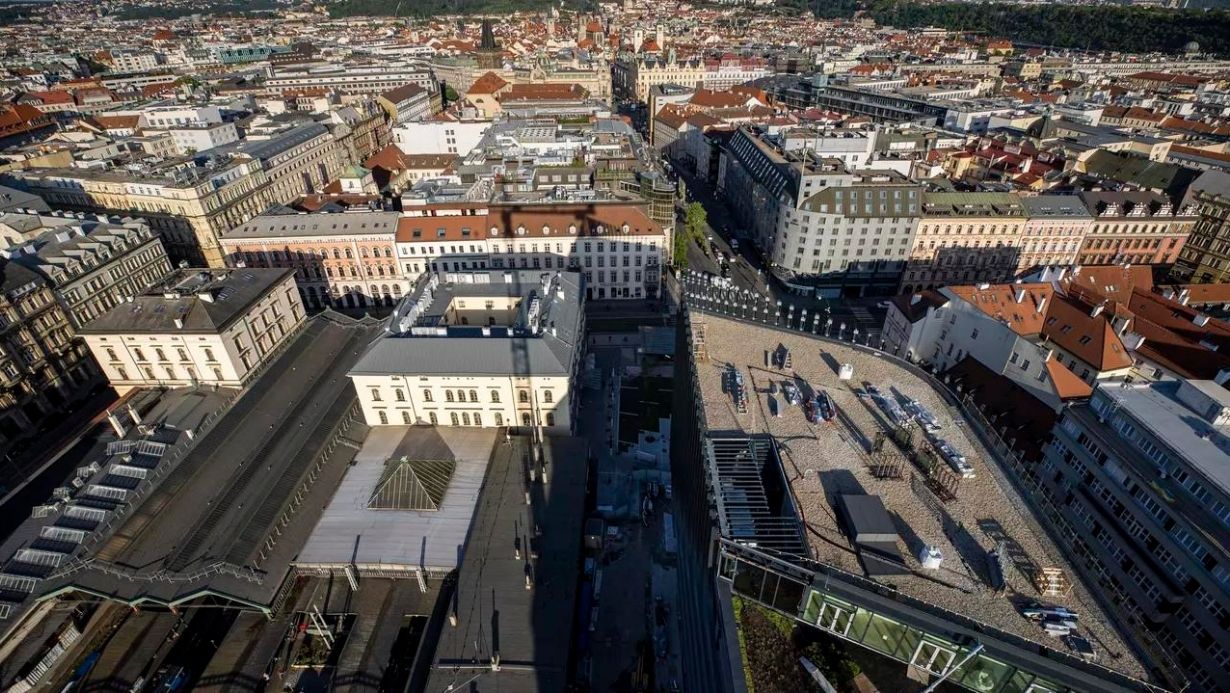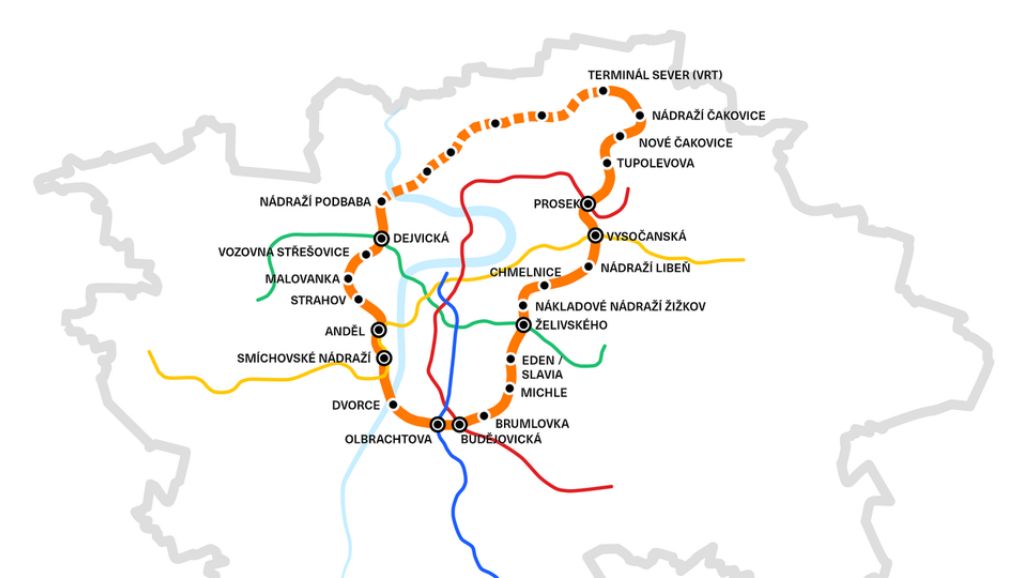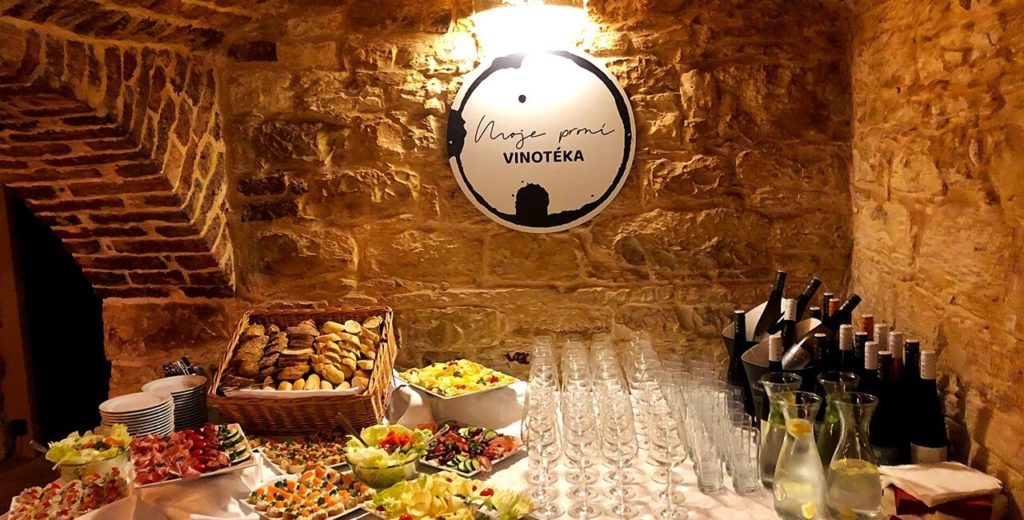The official start of the Masaryk railway station’s reconstruction in Prague took place today.
The project includes the installation of an elevated platform above the tracks, improved connections with Florenc, and an expansion from the current seven tracks to a total of nine.
Additionally, a new vestibule and rest area will be introduced. The completion date for this extensive redevelopment is 2027, with a total cost estimated at CZK 3.39 billion.
Transport Minister Martin Kupka (ODS), Director General of the Railway Administration (SŽ) Jiří Svoboda, and various representatives from the capital, construction firms, and Penta, the owner of surrounding buildings, inaugurated the renovation today.
The companies STRABAG Rail and STRABAG are the appointed contractors for the project. Notably, SŽ secured nearly 84% of the funding required for the station’s reconstruction from European funds.
Masaryk railway station, the oldest in the capital, serves up to 30,000 passengers daily.
Following the completion of the Prague to Kladno and Václav Havel Airport in Ruzyně line reconstruction, the station will become the launching point for the railway to the airport.

Older than 150 years Masaryk Station, the oldest railway station in Prague, has a rich history. The first train arrived there on August 20, 1845, marking the start of railway transportation in the city. Before that, the station only served as a terminus for horse-drawn carriages in 1831.
The station was designed by Jan Perner, with building architect Antonín Jüngling, and was built by a consortium of Vojtěch Lanna and the Klein brothers between 1844 and 1845.
It initially served as the final stop for the railway from Olomouc and Vienna to Prague.
In early December, a significant milestone was reached in constructing Prague’s metro line D.
The first section of the new line, spanning from the future Olbrachtova station to tunnel behind the future Pankrác D station, was officially connected as a wall between them came down.
Simultaneously, Prague City is taking steps towards the E metro line by appointing a coordinator for its planning.
Despite being previously referred to as Line O, the E line differs significantly, intending to form a circular route around the city center, linking Prague’s districts.
Zdeněk Hřib, deputy minister for transport, emphasizes the need for a thorough feasibility study to determine the route, technology, and approximate cost of this ambitious project.
“The current transport system will not suffice for Prague residents or visitors in the coming decades,” Hřib stated on Facebook. The E line aims to serve districts anticipating substantial construction development, particularly between Smíchov and Budějovická, as well as Prosek, Vysočany, and Žižkov.
“Imagine that the whole of Ostrava or even almost the whole of Bro moves to Prague. […] If we do not start tackling the radical strengthening of underground public transport in time, Prague’s streets will be overwhelmed, and Prague will suffocate. The streets are not inflatable and more cars or, for example, buses cannot fit in them,” the representative of the City of Prague Adam Scheinherr added.

The new line would be 36 kilometres long, with 23 stations, and potentially transport over 150,000 passengers a day and around 100 million each year.
According to earlier information provided by City Hall, it would lead from Nádraží Podbaba through Dejvice, Smíchov, Dvorce, Budějovická, Vršovice, Žižkov and Vysočany to Čakovice in the north of Prague.
In the second phase of construction, the line would then re-connect with Podbaba, with five further stops being added across the north of the city.
Autumn this year was the warmest since records began at the weather station at the Clementinum complex in central Prague, according to data released on Tuesday by the Czech Hydro-Meteorological Institute.
The average temperature between September and the end of November was 13.6 degrees Celsius.
September and October were the warmest seen since records were first made in 1775; November’s temperatures were 1 degree Celsius above the average for the time of year.
The second-warmest autumn ever recorded was in 2006, with an average temperature of 13.2 degrees.
In 1752 the first regular meteorological measurement was initiated at Klementinum and it has been continuing until now.
Thirty-three years of chosen weather characteristic measurements (temperature and air pressure) are unfortunately incomplete because they were often done by estimation.
So the year 1775 is considered the beginning of comprehensive succession. “Mannheim clocks” functioned as regular temperature measurements, according to which weather behaviour was noted always at 7 am,7 pm, and 9 pm.
Weather station Clementinum is the oldest weather observation considered unique in Central Europe.
In Clementinum there are two meteorological boxes – a slat and iron-plate. The slat box measures temperature and air moisture on the first floor of the north side of the south annex.
The iron-plate box is on the roof flat at the east annex where a technical library is located. The amount of rainfalls and duration of sunshine are noted every day with the help of an apparatus called a heliograph.
You can fly to Tallinn with Eurowings from 31 March, first three times, and from May four times a week on Mondays, Wednesdays, Thursdays, and Sundays.
A direct flight between the Czech Republic and Estonia is set to commence, as German low-cost carrier Eurowings plans to launch a Prague-Tallinn route on March 31, 2024.
This announcement was made on Thursday by the press service of Prague Airport.
For the initial month, the carrier’s aircraft will operate between the cities three times a week, and starting from May, the frequency will increase to four times a week, specifically on Mondays, Wednesdays, Thursdays, and Sundays.
The flight duration is estimated to be 2 hours and 10 minutes. Departure from Prague is scheduled for 13:25, while departure from Tallinn is at 17:15.
The historical heart of Tallinn is the medieval old town, Toompea, which was built between the 13th and 16th centuries when Tallinn was a thriving Hanseatic port. Today the entire quarter is a UNESCO World Heritage site and is without question the city’s biggest attraction.
With its cobbled streets, narrow alleyways, half-hidden courtyards, colourful medieval houses and extravagant churches, this hilltop neighborhood is the perfect place to spend a day. And the fact that it’s all neatly packaged within a mostly intact city wall and dotted with guard towers gives it an extra dose of fairytale charm.
If you have more than a day to spend in Tallinn, there are other areas of the city that are well worth a visit. For a glimpse at the city’s Soviet days, check out Vabaduse Väljak (Freedom Square).
For contemporary Estonian culture, the Telliskivi Creative City near the city centre is a great place to check out bohemian cafes, vintage shops, Estonian design concept stores, and plenty of cool street art.
Czech start-up Bene Meat Technologies is the first to win European Union registration for laboratory-grown meat for use in pet food and plans to boost production to make up to several metric tons per day next year, the company said on Wednesday.
A number of firms are racing globally to develop commercially viable lab-grown meat and fish products to appeal to consumers concerned about ethical issues and the environmental impact of livestock farming, a major source of greenhouse gas emissions.
In the United States, Upside Foods and Good Meat won regulatory approval in June for their so-called cultivated meat, made from animal cells, for human consumption, a second place after Singapore. But large-scale production is yet to begin.
Bene Meat has turned its focus to the pet food sector to deliver a product that can be marketed to global pet food makers as a raw material for inclusion in their final products.
The product received certification in the European Feed Materials Register, the company said.
Bene Meat next plans to test how the product tastes to animals, while scaling up production at its current Prague lab and at new premises it is looking for.
The start-up, set up in 2020 and owned by Czech medical devices producer BTL group, has more than 80 researchers and developers and has invested “high single millions” of euros into development, Kriz said.
The firm, like others, used cells from live animals, which grow in a vessel known as a bioreactor, fed by a supply of nutrients. He declined to comment on details.
The company is in talks with pet food makers on supplies, but also aims to work with them to potentially set up production lines at their current facilities. It also plans to develop its own brand of final pet food products.
Prague’s public transport system has undergone a striking transformation! Say goodbye to the old metro plans and say hello to the maps.
Starting this Thursday, new navigation maps will replace the traditional ones on every metro line. What’s new? The maps boast fresh colors and a revamped layout, with Wenceslas Square positioned at the center horizontally.
Additionally, they feature prominent city landmarks and green spaces. However, it’s important to note that this change is currently in the testing phase, as confirmed by Prague Integrated Transport (PID).
The goal is to ensure clear visibility of all lines and easy placement above carriage doors, making them visible to all passengers.
Given the intricate web of metro lines branching out in various directions, designing a coherent graphic has posed a challenge.
Visualizza questo post su Instagram
Un post condiviso da Pražská integrovaná doprava (@pidoficialni)
PID will conduct user surveys directly in the metro carriages to focus on the legibility and clarity of the graphics, as well as the need for various types of additional information.
If the feedback indicates success, these innovative maps could be rolled out across all metro cars as early as next year.
Irish low-cost carrier Ryanair will start flying between Prague and the Sicilian city of Catania.
The direct airline will begin operations on Tuesday, 31 October.
The carrier’s aircraft will operate between the cities twice a week – on Tuesdays and Saturdays. The journey time will be 2 hours and 15 minutes.
The cost of a one-way flight on a standard fare starts from CZK 850. For some dates, you can still find promotional offers for CZK 369 (e.g., for 31 October).
Note that direct flights on this route are currently operated by another low-cost carrier, Hungarian Wizz Air. It also flies twice a week, on the same days.
The increased competition should have a favorable impact on ticket prices.
Czech nationals will have the chance to join Ukraine’s defence forces to battle Russia’s invasion without fear of punishment at home, Czech Prime Minister Petr Fiala said on Thursday.
Under Czech law, it is illegal to join foreign armed forces without an exemption from the president who is the commander-in-chief of the Czech army. Violations are punishable by up to five years in prison.
CTK news agency reported this week at least 300 people had sought an exemption to answer Ukraine’s call for foreign volunteers to fight Russia’s invasion.
Fiala said after talks with President Milos Zeman on Thursday they had agreed to guarantee impunity for people who join Ukraine forces, rather than sort through individual requests.
The Czech Republic has been a NATO member since 1999.
The invasion of Ukraine, the biggest assault on a European state since World War Two, has caused unease in the former Soviet-era satellite states in central Europe, many of which border Ukraine and have seen an influx of refugees.
It has also prompted growing interest in joining domestic armies. The Czech defence ministry has reported a several-fold increase in the number of potential army recruits.
Are you looking for some new places to eat? Here is a list of newly opened businesses.
- Aux Merveilleux de Fred
- Address: Revoluční 8, Prague 1
If you have a weakness for the art of confectionery, head to the newly opened Prague branch of Aux Merveilleux de Fred for a tasting. Everything created here is under the guidance of the recipes of the French confectioner Frederique Vaucamps, who built a confectionery network with branches all over the world.
The goodies that have so far been enjoyed by guests in France, the USA, Canada and Japan are now also available to Czech guests. Be careful when you set out here – meringues, cakes, waffles, croissants and brioches in Aux Merveilleux de Fred are highly addictive.

- The Winery
- Address: Liborova 13, Prague 6
Bistro The Eatery, which has made it to the Michelin Guide thanks to its refined menu, has a freshly opened partner – a wine company called The Winery.
The owner David Šindelář arranged cooperation with 29 winemakers from Bohemia and Moravia, Austria, Germany, France and Italy, and the result is this brand-new winery in Břevnov. Judging by the bar they set with The Eatery, it is recommended that you don’t delay too much when visiting the wine bar as it gets busy very quickly without a reservation.

- Bistro & Bar Koule
- Adress: Milady Horákové 54, Prague 7
A new establishment in Letná, you can enjoy a variety of mixed drinks, beer, and cheese. Their famous cheese balls are round and fried, and already became a hit in the city! They have a total of 15 types of cheese balls and 9 home dips. Cheddar, goat and blue cheese pieces are among the absolute favorites so far, be sure not to miss them from your order.

- Moje první vinotéka
- Address: Štítného 16, Praha 3
If you want to experience the exceptional atmosphere of the Moravian cellar in the city center- this is the place to go. You can have a drink in this Žižkov wine shop with a unique “underground” atmosphere.
They will offer you wines to drink mainly from Czech suppliers, as well as having the option to graze on pickled camembert, olives, or nuts. Soon, they are planning to expand the offer with a cheeseboard.

In December 2021, the UAE became the first country in the world to shift to a four-day workweek.
Inspired by the move, Belgium has also allowed its employees to work for four days a week, while also giving them the right to disconnect after work hours.
Those who want to subscribe to the new work regime will have to work 10 hours a day instead of the usual eight. The pay shall remain unchanged.
According to Euronews.com, Belgian prime minister Alexander de Croo told a press conference: “We have experienced two difficult years. With this agreement, we set a beacon for an economy that is more innovative, sustainable, and digital. The aim is to be able to make people and businesses stronger”.
The draft reform package agreed by the country’s will means that employees will have the right to request a four-day week and the employer must give solid reasons for refusal.
Over a 6 month period, employees will trial the 4 day work week and if they prefer they can return to a five-day week with no negative consequences.
The changes won’t be implemented immediately, but are expected to come into effect by the middle of the year.
After the UAE and Belgium, Spain, Scotland and Japan too have plans to permanently shift to four-day work-week. Scotland had launched a trial four-day workweek in September last year, which was a success.
Would you like to see this introduced here in the Czech Republic?
Hammering home the city of Ostrava’s transformation from an industrial coal and metal mining center in the 20th century to the modern metropolis it is today, CHYBIK + KRISTOF has revealed plans for the Czech Republic’s tallest building: Ostrava Tower.
Subtly shaped like an X, the 56-story, the 235-meters-tall tower is the latest piece of urban infill for Ostrava, as industrial lots have given way to new residential and cultural buildings such as Steven Holl’s 2019 concert hall.
Flaring at the base and pinnacle and cinched at the waist with a 90-degree turn between the top and bottom, each of the three points contains public spaces; a barrier-free ground floor to allow for a seamless transition for pedestrians from the plaza at base level and the local bus terminal, and a public bar, cafe, and restaurant with panoramic views of the city at the very top.

Ostrava Tower will sit both next to a bus terminal and at the base of a bridge, anchoring the city’s core when it opens in 2027 (Courtesy CHYBIK + KRISTOF Architects & Urban Designers)
In between those two terminuses will sit residential units, offices, a hotel, retail, and a “congress centre”.
“Rethinking the typology of the skyscraper,” said architect Michal Kristof, co-founder of CHK, in the project’s announcement, “and its function to serve the public and activate the urban environment, one of our core missions was to create a positive social impact in the heart of Ostrava. The studio’s intention was to create a simple but powerful form that acts as a beacon into the city center.”

The top floor will feature a public bar, cafe, and restaurant below a canopy that matches the zigzags of the tower’s form (Courtesy CHYBIK + KRISTOF Architects & Urban Designers)
Ostrava Tower will be wrapped in a “jittering,” pleated glass facade that closely follows the jagged floor plates of each story.
Aside from the aesthetic flair, increasing the complexity of the tower’s edges also corresponds to an increase in viewing angles.
A copper-colored metal brise-soleil will top the roof deck and undulate with the same sharp curves of the building below while shading guests.
Russia dropped its final game of the round-robin after losing 6-5 to the Czech Republic in one of the craziest games of the men’s Olympic hockey tournament.
The game ended Group B preliminary round play, with Russia taking the top spot with seven points, Denmark sitting second with six and the Czech Republic and Switzerland closing out the pact. The rest of the qualification round seedings will be finalized on Sunday when Group A and Group C finish play.
The Russians struck first at 4:51. Vladimir Tkachyov beat Simon Hrubec with a hard shot after a pressure-packed start to the game by the Russians. The Czechs would answer back at 12:37 when Tomas Kundratek’s shot beat a screened Ivan Fedotov, the first goal he allowed all tournament long in his third start of the tournament.
The game remained tied until 32:19 when Nikita Nesterov’s point shot blew through open ice and beat Hrubec to restore Russia’s lead.
But that’s when everything went bananas.
A penalty to Dmitry Voronkov at 37:34 proved to be extremely costly for the Russians, giving the Czechs a five-minute power play. David Krejci scored at 18:42 on a one-timer opportunity before Michael Spacek walked in and blasted a shot that squeaked past Fedetov’s blocker and in for the 3-2 goal.
The Czechs finally scored a 5-on-5 goal against Fedotov. At 43:14, Lukas Klok would use traffic in front of the Russian net to fire the puck in for his first goal of the tournament, giving the Czechs a two-goal lead.
At 3:50, Kirill Semyonov scored to make it 4-3 before Arseni Gritsyuk flew by a defender to tie the game at four apiece.
But the scoring wasn’t done. Russia took the lead back at 48:22 when Andrei Chibisov beat Hrubec with a shot that seemed to surprise Hrubec, who was unprepared for the opportunity. Speaking of surprise, Tomas Hyka scored 35 seconds later when his shot from below the goal line bounced off the leg of an unsuspecting Fedotov for the 5-5 goal.
The game required overtime to decide the victor, the second such game to go beyond the scheduled distance for the Czech Republic in a row. With Alexander Nikishin in the box for slashing, Lukas Sulak scored a power-play goal with 30 seconds left in the extra frame to give the Czechs the win, similar to the team’s result against the Swiss in the shootout two days prior.
